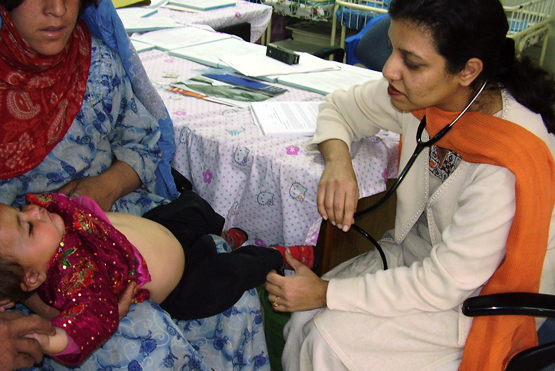The Best Place for Pneumonia May Be at Home
BU prof suggests new WHO guidelines for treating a deadly disease

Every year, more than two million children worldwide die of pneumonia. Recent research by Donald Thea, a professor of international health at the School of Public Health, suggests that some of these lives might be saved by actually reducing the intensity of pneumonia treatment in the developing world through at-home treatment of the illness.
On February 29, Thea, the director of clinical sciences at Boston University’s Center for International Health and Development, will appear before the World Health Organization (WHO) in Geneva to recommend changing the organization’s guidelines on treating pneumonia in children. Based on a recent study he conducted with Pakistani researchers, he will advocate that children with severe pneumonia be treated at home instead of at the hospital.
The WHO has long held that children with severe pneumonia — a broad field diagnosis based on respiratory rate, the presence of cough, and difficulty breathing — should be brought to a hospital and treated with injected antibiotics. Milder infections, on the other hand, can be treated at home with oral medication, according to the current guidelines.
But a trip to the hospital in the developing world can be difficult, and dangerous as well. In addition to the expense of a hospital stay, which is often beyond the reach of rural families, roads are poor and transportation can be hard to arrange. Plus, parents can’t leave other children without a caretaker while their sick child is hospitalized for several days. Finally, “hospitalization in the developing world can pose risks to children,” Thea says, “because conditions aren’t always completely sanitary.”
Thea and acute respiratory infection researchers from the Pakistan Institute of Medical Sciences first conducted a four-year study showing that oral antibiotics were just as effective as injected medication. Then, beginning in 2006, the researchers studied 2,037 children under five years old at seven test sites in Pakistan, with a grant from the United States Agency for International Development (USAID). All of the children had come to a hospital or health center and been diagnosed with severe pneumonia. While half remained at the hospital and were treated with injected antibiotics, the other half were sent home with oral medication. All the children were visited regularly by study physicians.
The researchers tracked the percentage of “treatment failures,” meaning that the children did not recover adequately or that new medications needed to be administered, and according to Thea, “we found that the efficacy of oral therapy dispensed by the mother or caretaker at home is equivalent to injected therapy in the hospital.”
In addition, more of the children who were hospitalized died of the disease, although Thea emphasizes that the differences in mortality were not statistically significant.
After Thea testifies at the WHO next week, he will return to work on an ongoing follow-up study in Pakistan looking into whether trained community health workers can effectively and safely diagnose and manage children with severe pneumonia while the children remain in the community.
“If that study is successful, we’ll hopefully be able to more effectively treat the children who are in the most remote locations and are hard to reach,” he says, adding that this could lead to more recommendations for changes in WHO treatment guidelines.
“The WHO guidelines are based on assumptions, because they have to provide guidance in the absence of good evidence, which can take years to accumulate,” says Thea. “It’s our job is to get that good evidence to support and improve global guidelines for managing disease.”
Chris Berdik can be reached at cberdik@bu.edu.
Comments & Discussion
Boston University moderates comments to facilitate an informed, substantive, civil conversation. Abusive, profane, self-promotional, misleading, incoherent or off-topic comments will be rejected. Moderators are staffed during regular business hours (EST) and can only accept comments written in English. Statistics or facts must include a citation or a link to the citation.